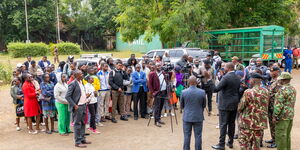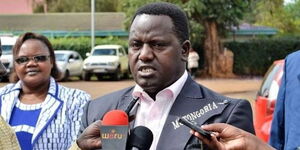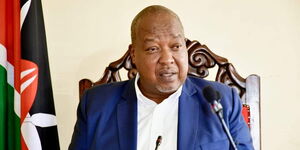Kenya is among nine African countries, under the low- and middle-income category, that are set to be among the early beneficiaries of lenacapavir, a long-acting HIV prevention drug, following a recent Global Fund deal.
According to the Division of National AIDS and STI Control Program, the drug, which is expected to be in the country by January 2026, will play a key role in thrusting the country towards its ultimate goal of eliminating HIV/AIDs by 2030.
In a statement on Monday, July 9, Global Fund confirmed that it had penned an agreement with Gilead Sciences, a US-based pharmaceutical, which is the manufacturer of the drug, that will allow over 120 low- and middle-income countries (LMICs) to access the drug. This will mark the first time in history that an HIV prevention drug is introduced to these countries at the same time as in high-income countries.
The eight other African countries that are expected to receive the drug by January include Eswatini, Lesotho, Mozambique, Nigeria, South Africa, Uganda, Zambia, and Zimbabwe.
Lenacapavir, which was approved by the United States' Food and Drug Administration in June this year, is taken twice per year and offers a cheaper and more powerful alternative to other daily oral PrEP pills.
The Global Fund aims to supply the drug to at least 2 million people globally, especially focusing on countries with high HIV incidence, particularly in sub-Saharan Africa, which continues to bear the brunt of the pandemic.
"The agreement follows the U.S. Food and Drug Administration’s approval of lenacapavir for HIV prevention in June and represents one of the most significant advances in HIV prevention in decades," the Global Fund said.
"As the first twice-yearly, long-acting injectable for pre-exposure prophylaxis (PrEP), lenacapavir expands the HIV prevention choice basket — offering a powerful new option for people who experience stigma, adherence challenges with existing PrEP tools, or other barriers in their daily lives," it added.
According to the World Health Organization (WHO), an estimated 39.9 million people, both adults and children, were living with HIV at the end of 2023.
Lenacapavir, which belongs to a new class of antiretroviral drugs known as capsid inhibitors, demonstrated nearly 100 per cent effectiveness in preventing HIV transmission during a large-scale clinical trial conducted last year.
As Kenya grapples with the reality of 1.378 million Kenyans are living with HIV, according to the Kenya Demographic and Health Survey (KDHS) 2022, this drug represents a beacon of hope.
"The WHO African Region remains most severely affected, with one in every 30 adults (3.4%) living with HIV and accounting for more than two-thirds of the people living with HIV worldwide," WHO stated.
The Global Fund, which is formally known as The Global Fund to Fight AIDS, Tuberculosis, and Malaria, is a partnership that mobilises resources from donors and other partners to combat these three diseases, especially in countries that have been most affected.
Global Fund assured that it will be at the vanguard of advocating for other strategies such as condoms, oral PrEP, and voluntary medical male circumcision, to see the effective prevention and elimination of the disease, which has claimed millions of lives globally for decades.
“This is not just a scientific breakthrough - it’s a turning point for HIV/AIDS. For the first time, we have a tool that can fundamentally change the trajectory of the HIV epidemic - but only if we get it to the people who need it most," said Peter Sands, Executive Director of the Global Fund.












